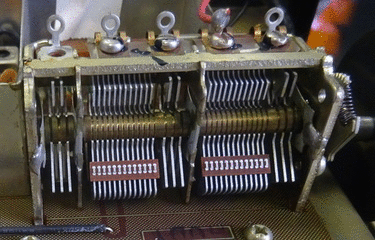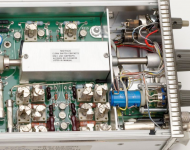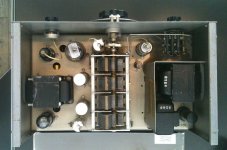Gerhard, I don't understand your point. Of course, pots are not so long lasting as pure resistances. Of course, they are noisier than metal film, but how do-you tune the quiescent current of an amp with the tolerances of all the active devices that can be far from the model ? Or adjust a DC drift if you don't want a servo ? (and, even with a servo, it reduce distortion)"Every trim pot shows the designer's incompetence." (My diploma thesis supervisor)
Good circuits must be predictable and they must work perfectly
with the pre-computed parameters.
It seems it is only high end audio where tinkering with arrays
of loose contacts made from coal or cermet is acceptable.
Reading a pot or an adjustable resistance on a schematic do not mean that it has not been replaced by fixed resistances on the bench after tuning. Like the laser trimming in I.C..
Take a differential line receiver, as an other example, how can-you achieve the SSM2141 100dB, or Thats1200 90dB of common mode rejection with resistances of 1% tolerance without trimming ?
The maxim of your diploma thesis supervisor sound great, but, like often, it looks to me like a early generalization.
Last edited:
Most HP-Agilent pharmaceutical , measuring instrument or medical device of the past were a shocking experience: no trimmer, but all the resistors were noted like this 75.3kohms, 84.7 ohms, 2.63kohm...and so on...and that was the most expensive equipment bought by research labs ub my country at the time and also the only equipment that had no trimming pot at all...well HP had their own transistors and op-amps too and you couldn't find a damn datasheet for them...you could only see the gold and the lowest offset in the industry on a part named like this 347807-87...Reading a pot or an adjustable resistance on a schematic do not mean that it has not been replaced by fixed resistances on the bench after tuning. Like the laser trimming in I.C..
.
Last edited:
"Every trim pot shows the designer's incompetence." (My diploma thesis supervisor)
Good circuits must be predictable and they must work perfectly
with the pre-computed parameters...
This is perfectly legit within an industrial or automotive context, with predictable inputs and pre-defined outputs.
In audio, it's a different story: inputs are unpredictable, from symphonies to (God forbid) Techno, further "enhanced" by mischiefs such as cartridge mistracking, filter ringing, and so forth. Also, we have no idea of what the circuit is driving: it can be capacitive, inductive, or any viscious combination thereof. That's why if you care about the sound, you try to squeeze the maximum out of what you have and hope for the best. And if by doing so, you need to get your hands dirty and deal with charcoal, be it.
Of course, if you only care about 20-20KHz with .01%THD and such, you can get away with no trimming at all. Just look at all the mid-fi products around; but are they worth reproducing in a DIY context?
Last edited:
Suitable product for a certain segment. We are fortunate to have good designers and educators working hard on it....and that was the most expensive equipment bought by research labs ub my country at the time and also the only equipment that had no trimming pot at all...
The rest would just have to swallow crappy laser trim, trimpots and matching of parts due to the incompetence and laziness of the ungood circuits created by leftover designers for the lower segment. 😀
Attached is an AES paper collecting many of the latest info on high resolution audio. It talks about dynamic range and what is needed based on some good research and some of the proposed "why's" of extended bandwidth. Its open so no copyright issues and an interesting read.
Good summary paper. More attention to the affects of filtering are needed.
-RNM
Instead of trim pots some products have groups of parallel resistors. So you can during assembly make adjustments but there should be no drift after that.
At least i know that about me...
Plus that you must be an expert con man, because from your posts, the impression I get is that it must be rather the opposite of what John posted 😀
Makes-me remember those old radios with variable capacitors.The front end of the venerable 7A22, a tweakers delight.

the phono stage with variable capacitors - Not sure why the shafts are inside, there should be vernier dials on front panel, like in Audio palette
Last edited:
the phono stage with variable capacitors - Not sure why the shafts are inside, there should be vernier dials on front panel, like in Audio palette
Looks like Romy the Cat's phono stage 😉
Romy the Cat's Audio Site's Maifesteo
Test equipment too ......Makes-me remember those old radios with variable capacitors.

Attachments
Absolutely, I'm THE con man! I told myself that i am rich before going to sleep and in the morning i found the neigbour's Ferrari parked outside in front of my house cause he has now a Bugatti in front of his...Plus that you must be an expert con man,
Come on...this must be Solid Works 🙂The front end of the venerable 7A22, a tweakers delight.
Makes-me remember those old radios with variable capacitors.

Maybe this one will fit even larger pre-amps 🙂
Tour de Suisse par l'''Exterieur | Tour de Suisse par l'''Exteri… | Flickr
In your opinion.
I can only judge on his writings and as he wrote:
"Since sheer quessing will yield the correct answer 50% of the time, a minimum of 12 trials is needed for statistical validity (16 is better,20 better yet)."
(Peter Aczel; The Ten Biggest Lies in Audio; The Audio Critic, Issue No. 26, 6)
which is nonsense. What you´ve quoted, is just opinon based on lack of information. Of course it is possible that he knew better but nevertheless wrote this nonsense.
I heard that you are in audio business.
Wasn´t Peter Aczel also in the audio business?
Not relevant evidence but pinion and conjecture often already cited.
No, the evidence shows that the different test protocols have an impact on the response of the participants.
Conjecture (partly) is the thinking about the internal mental processes that are the reason for these different response patterns.
See for example these numbers for an experiment from one of the mentioned often cited publications (attached gif).
It shows the number of correct responses (expressed as percentage correct) for the various test protocols.
The same sensory difference (onedimensional) was presented to the same group of participants under three different test protocols as mentioned in the table.
Samples presented in random order, retasting allowed, rinsing with water included.
Graphic produced from:
Yu-Ting Huang,Harry Lawless; Sensitivity of the ABX Discrimination Test; Journal of Sensory Studies 13 (1998) 229-239.
If stress debilitates your hearing ability, just take your time do little at a time as Peter suggested.
Nice advice in hindsight but unfortunately nobody told the listeners back then that they should train under the specific test conditions, that they need accommodation time and that positive controls are mandatory (negative controls as well).
Which publications i´ve cited in other threads on this topic do you have read?
Don´t be shy, explain in detail where the authors failed to do propper work and were publishing just opinion and "conjecture"
Last edited:
C'mon, Jakob2. You are in the audio business. So, like all of us, you just try to sell snake oil. It is well known.Wasn´t Peter Aczel also in the audio business?
That I feel strange is that Peter A. paper is took more seriously than your comments. May-be because he said something that look close to this article of the reader's digest that has founded the deep scientific culture of our friend that dislike minor third chords?
Between you and me, why do-you loose your time in even answering ?
Wasn´t Peter Aczel also in the audio business?
Yes, he lost credibility, and rightly so, when he favorably reviewed a speaker that he designed.
On Peter Aczel's Retirement - Audiophile Review
"Also the problem of credibility as a result of Aczel's rave review of the Fourier 1 speaker,
which he designed, didn't help matters. Sure, he mentioned that he had a hand in the design,
but why not let one of his other writers do that review? Why, indeed..."
Now we have The Audiophile Administration Bureau 🙂C'mon, Jakob2. You are in the audio business. So, like all of us, you just try to sell snake oil. It is well known.
"The drastic amount of fraud extending to the drug epidemic was unfolded, and exposed with a judgment against Clark Stanley, which condemned the patented Clark Stanley's Snake Oil Liniment in US District Court. This minor ruling, much like the process that unfolded in the UK during the previous century, set a precedent for government bureaucracies to exert greater authority over traditional practices in health and medicine. Snake oil has grown to epitomize patent medicine, and represents a healthy act of scapegoating that allowed for government controlled bureaucracy to effectively seize authority over the means to control a drug epidemic involving alcohol and opium during the 19th century in the US. This increased authority led to the evolution and expansion of bureaucracies such as the Food and Drug Administration in the US."
extracted from wiki page:
Snake oil - Wikipedia
YouTubeNow we have The Audiophile Administration Bureau 🙂
snip... Klark Stanley...snip.
But, well, Stanley Clarke was quite a good bass player.
He deserves the indulgence of the jury if he bears the proof that it is he who plays on his records. ;-)
Last edited:
- Status
- Not open for further replies.
- Home
- Member Areas
- The Lounge
- John Curl's Blowtorch preamplifier part III

